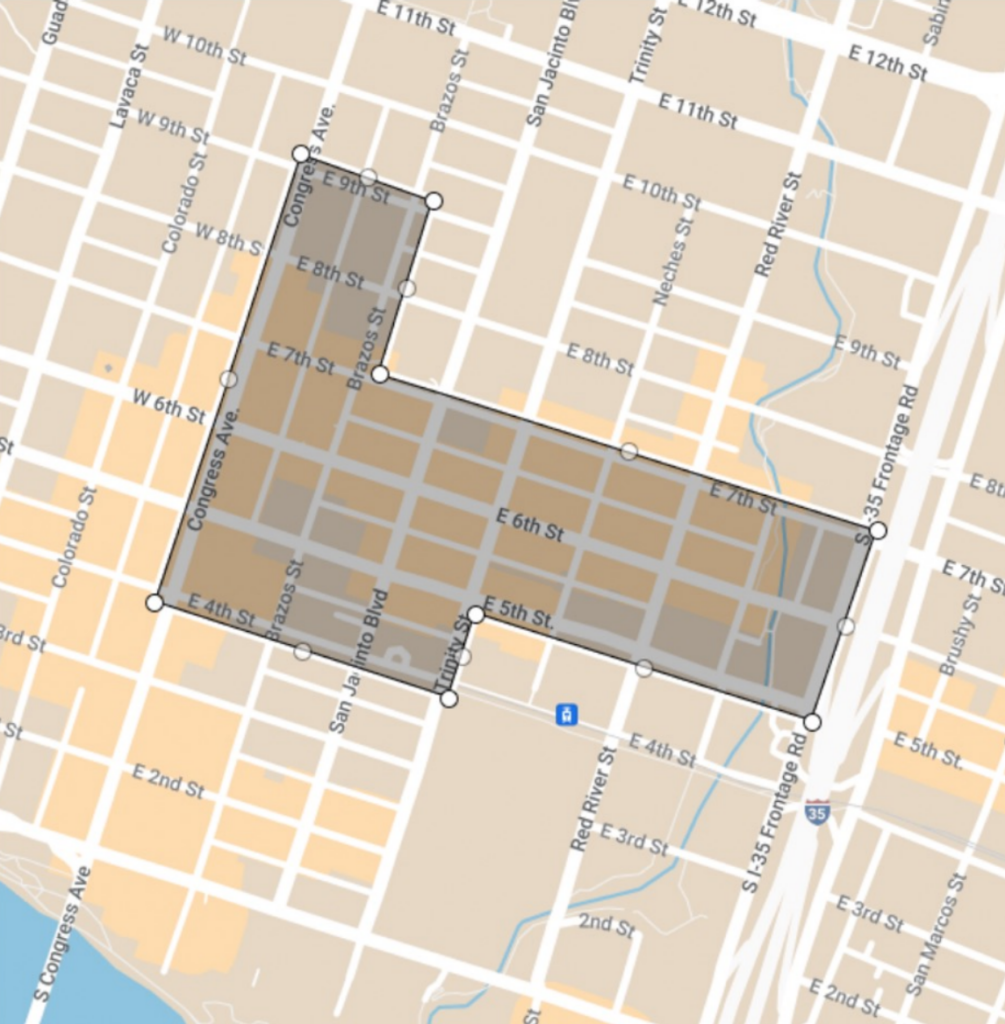DAA, Urban Alchemy partner to improve outreach, services for downtown homeless population
Friday, January 19, 2024 by
Chad Swiatecki Downtown Austin Alliance hopes its new pilot program will help to provide more services and housing opportunities to the homeless people clustered throughout the city’s central business district.

Area of the proposed pilot. Credit: Downtown Austin Alliance
On Thursday, the DAA announced its Homeless Engagement Assistance Response Team (HEART), which will launch as a six-month trial program on Feb. 1. In partnership with staff from Urban Alchemy, the nonprofit group that manages two downtown shelters, HEART will operate during daytime hours in the area between Congress Avenue and Brazos Street and Fourth Street and Ninth Street, as well the Fifth Street to Seventh Street blocks from Congress Avenue, to the Interstate 35 West frontage road and in the 200-300 block of Fourth Street.
HEART’s three-person teams will be charged with reaching out to those experiencing homelessness to address nonemergency issues, de-escalating behavioral issues, providing interventions to address mental health episodes and preventing crimes. The program, which will cost $150,000 for the trial period, is an escalation of DAA’s Ambassadors, who have dozens of interactions with homeless people every day but aren’t solely focused on addressing related health needs and other needs.
Bill Brice, DAA’s senior vice president of investor relations, said Urban Alchemy’s practitioners bring experience living with homelessness and related training into the field, with the goal of building relationships and trust to steer those living on the street into one of the more than 200 shelter beds located downtown.
“These are people that have lived experience with long-term homelessness, potentially lived experience with substance use recovery, people that may have been incarcerated for long periods of time, people who have kind of lived or walked in the shoes of folks that they’re going to be interacting with out on the street,” he said, noting that Austin Police Department staff and other entities interacting with the homeless community don’t have the same level of familiarity.
“It just makes so much sense to have the organization that’s managing those downtown resources and facilities out on the street, helping to engage with folks and say, let’s get you off the street. Let’s get you comfortable. Let’s get you a cup of coffee, a sandwich and the threshold of services, hopefully to encourage people to accept shelter.”
A program supervisor will gauge the effectiveness of the pilot program based on changes in quarterly counts of unsheltered homeless people; the number of engagements and de-escalations; placements into shelter, services, housing, medical and mental health treatment; diversions from APD resources; and the numbers of responses to service requests and self-initiated contacts. Brice said next week’s quarterly count of the downtown homeless population will set one of the initial benchmarks to evaluate the program.
While HEART is slated to run through the end of July, Brice said he expects the data gathered through May should paint a clear enough picture of its effectiveness and help DAA leaders decide on how to expand and extend the program, likely in partnership from an assortment of nonprofit groups and local business organizations. He also said HEART could prove to be a model that would work in other areas of the city if other entities are interested in managing any satellite operations.
Brice also said he supports the city’s plan to use a forthcoming study from McKinsey & Company to better coordinate efforts to address homelessness that involve the city and an assortment of other public, private and nonprofit entities.
“Let’s understand what are all the different things that we’re investing in, and to what extent is it permanent supportive housing, is it shelter, is it other services? What are all those things and the amounts that are going toward them, and then what’s the return on that investment?”
Photo made available through a Creative Commons license.
The Austin Monitor’s work is made possible by donations from the community. Though our reporting covers donors from time to time, we are careful to keep business and editorial efforts separate while maintaining transparency. A complete list of donors is available here, and our code of ethics is explained here.
You're a community leader
And we’re honored you look to us for serious, in-depth news. You know a strong community needs local and dedicated watchdog reporting. We’re here for you and that won’t change. Now will you take the powerful next step and support our nonprofit news organization?







